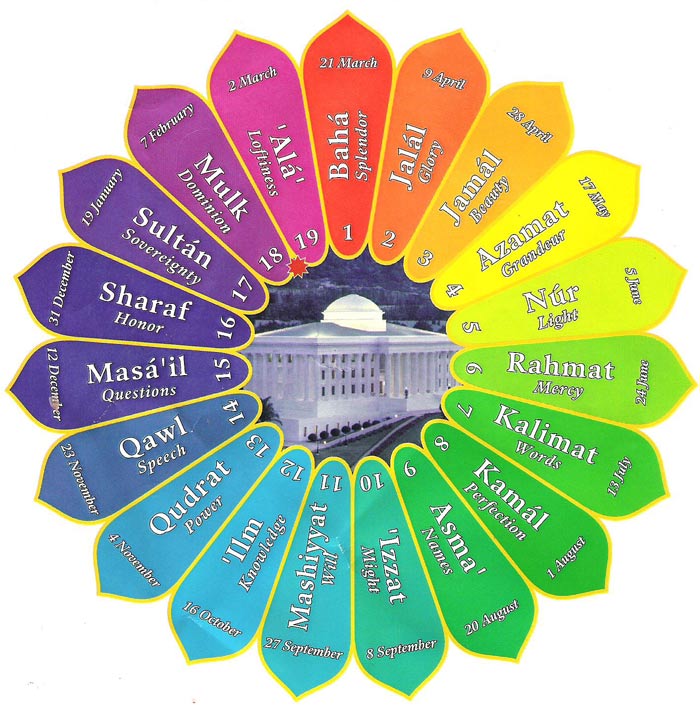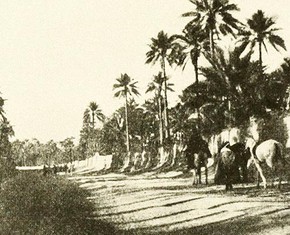The views expressed in our content reflect individual perspectives and do not represent the authoritative views of the Baha'i Faith.
Recently a Baha’i friend asked me an interesting question: “What does the Baha’i month of ‘Questions’ mean?”
When he posed this question, he wasn’t asking me for a definition. We all know what a question is. His query really concerned the deeper spiritual meaning of “Questions,” and whether or not it is an attribute of God, like the names of the other 18 months in the Baha’i calendar—Mercy, Light, Splendor, etc.
It turns out the answer isn’t simple—but it is profound. So let’s put his question about “Questions” in context.
The Baha’i calendar was originally created by the Bab, who called it the Badi Calendar, which means “new” or “wondrous.” To say that this calendar is new, novel and different would be an understatement. The Badi Calendar has 19 months of 19 days, with four intercalary days (five in a leap year), rounding out the solar calendar. Even more interesting, each weekday, each day of the month, each month, each year, and each cycle of years has a spiritual name, usually understood as essential characteristics, attributes or “Names of God.”
These are no mere names—they are, in fact, attributes of God. Herein lies the paradox: God, in essence, transcends all names and attributes. Properly speaking, these names belong to how God manifests in the world of creation. Attributes or qualities of the highest order, these names are also known as divine perfections. In a perfect creation, all created things reflect one or more of these perfections. How much more true is this of man, the apex of creation. How much more true is this of the prophets and founders of the world’s great Faiths, the perfect mirrors of all the names and attributes of God.
These beautiful, poetic, mystical “Names of God” come from a famous morning prayer recited during the month of fasting in Shiʿi Islam. This celebrated prayer is known as the Duʿāʾ al-Saḥar (“Dawn Prayer”) also referred to as the Duʿāʾ al-Bahā, or the “Prayer of Splendor/Glory.” Baha’u’llah refers to the Duʿāʾ al-Saḥar as the Lawḥ-i Baqa, the “Tablet of Eternity.” This dawn prayer contains the “Greatest Name of God,” which Baha’is recognize as Baha, which means “Splendor” or “Glory.” In the dawn prayer, there are twenty-two names by which the supplicant beseeches God. The Bab chose nineteen of them for the Badi Calendar. The first invocation of the remarkable prayer reads as follows:
O my God!
I beseech Thee by Thy Baha (Glory) at its most splendid (abha)
for all Thy Splendor (bahāʾ) is truly resplendent (bahiyy).
I, verily, O my God!
beseech Thee by the fullness of Thy Splendor (bahāʾ).
– Translated by Stephen Lambden
As previously said, God transcends names and attributes. For instance, we often say that “God is one.” True, but God transcends singularity, as the Bab states: “Among these reasons is the incontrovertible testimony of the intellect, that naught existeth besides the Essence of Eternity, and that He posesseth no attributes, of whatever different meaning, save His own Essence.” – provisionally translated by Nader Saiedi, Gate of the Heart, p. 194.
Because singularity is a human concept, as abstract as it may be, it is a projection of human intelligence, which conceptualizes by means of ideas, which it takes human intelligence to understand. In other words, the highest thoughts that we can imagine cannot surpass our own mental limits. We can never comprehend God. The best we can do is to apprehend some of the qualities of God manifested in creation, and which appear most fully and perfectly in the prophets of God, such as Moses, Zoroaster, Buddha, Jesus, Muhammad, Deganawida (“the Peacemaker”), the Bab and Baha’u’llah.
Many, if not most, of these names of God are recognizable, if not familiar—Loftiness, Glory, Grandeur, Knowledge and Beauty. There are other attributes as well. This is where the question regarding the month and the attribute of “Questions” arises. Here’s the verse in the Duʿāʾʾ al-Saḥar, or Duʿāʾ al-Bahāʾ:
O my God!
I beseech Thee by Thy questions (masaʾil) which are most agreeable of Thee
for all of Thy concerns (masaʾil) are truly beloved.
I, verily, O my God! beseech Thee by the whole of Thine affairs (masaʾil).
– Translated by Stephen Lambden
As you can see in this verse, the Arabic word for “Questions”—masāʾil—has other meanings as well: “concerns” and “affairs.” Besides “questions,” masāʾil also means “issues,” “problems,” “points in question,” and “theses.” (In Islamic law, for instance, al-masāʾil al-fiqhiyya means “questions of jurisprudence.” Masāʾil fi al-ṭibb translates as “Handbook of Medicine.”)
We know that Godly attributes can become goodly human virtues. In other words, divine qualities are the secret formula in the elixir of spiritual transformation. In the alchemy of the spirit, the copper of satanic fancy is transmuted into the gold of angelic perfections.
So “Questions” as a godly attribute is divine concern for human affairs. “Questions” as a goodly attribute is humane concern for human affairs. Questions, in a Baha’i context, means concern for others, and the ability to ask—and answer—the questions that will help them.
Prophets are equal, their revelations distinct, their laws progressive—propounding truths, offering salvation, bestowing grace, teaching harmony, tendering liberation, influencing society, advancing civilization, promoting science, demanding equality, ennobling character, enlightening individuals, mystifying reality, giving purpose, deepening identity, enriching life, ethicizing actions, imparting vision, inspiring volition, guiding decisions, benchmarking morals, strengthening families, promoting charity, mitigating suffering, championing justice, advocating peace, cultivating reciprocity, uplifting morality, emboldening initiative, rewarding righteousness, exalting virtue, celebrating spirituality, encouraging industriousness, promising afterlife, assuring immortality, broadening horizons, expounding mysteries, cultivating reflection, uplifting joy, and vitalizing life.
In his mystical and practical calendar, the Bab arguably has revealed the most original and profound spiritual teachings on the nature and qualities of God. No question.
Some of the information in this article was provided courtesy of Omid Ghaemmaghami.
You May Also Like
Comments


















May 24 - When God Speaks—Eloquently
May 21 - Developing Spiritual Power
May 20 - ...Genius, Knowledge and Universal Enlightenment
May 16 - The Mystical Source of Human Will-Power
May 13 - Might as Spiritual Empowerment
May 10 - Understanding Names and Attributes as Energies
May 7 - Perfection as a Verb
May 4 - Words as Deeds
May 1 - Have Mercy! How to Be Merciful
Apr. 29 - How to Be Truly Honored—and Honorable
Apr. 25 - Using Light for Enlightenment
Apr. 22 - Developing Grandeur of Spirit
Apr. 20 - Glory: Respect is Better Than Fame
Apr. 18 - How to Personify Beauty